Serena Williams, Tennis
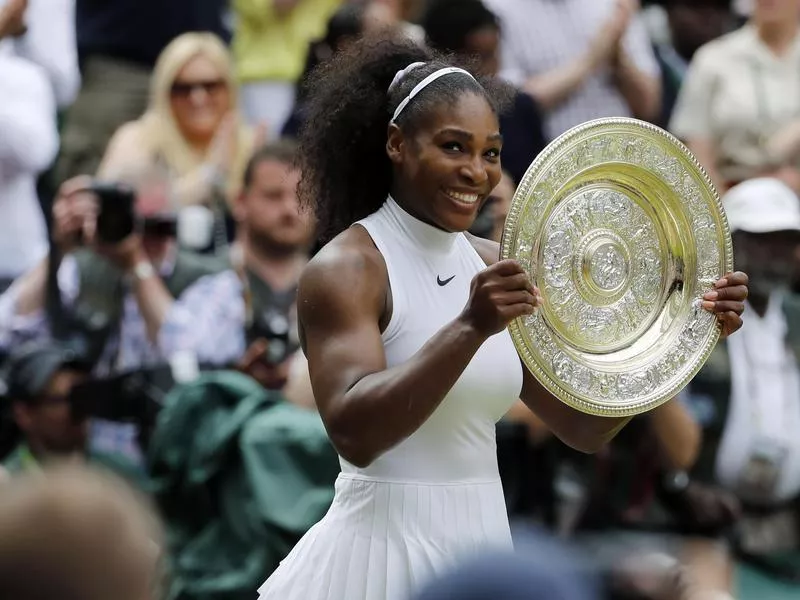
Serena Williams holds her trophy after winning the women’s singles final against Angelique Kerber of Germany at the Wimbledon Tennis Championships in London, July 9, 2016. Ben Curtis / AP Photo
Serena Williams was eight weeks pregnant when she won the 2017 Australian Open — but the world didn’t know that for another three months, when she posted a photo of her baby bump on SnapChat.
Her daughter, Alexis Olympia Ohanian Jr., was born September 1, 2017.
After a harrowing birth — an emergency C-section followed by life-threatening complications that left Williams bedridden for six weeks — she return to the court, professionally, in March 2018.
Her ranking at the time — No. 451 — was a precipitous drop from No. 1 just a year prior, sparking debate about her being punished for taking maternity leave.
On recovering after birth:
“I went from being this world-class athlete to not being able to roll out of bed or move up and down. To be physically knocked down that hard was pretty rough.”
On finding fulfillment in motherhood:
“When I’m too anxious I lose matches, and I feel like a lot of that anxiety disappeared when Olympia was born. Knowing I’ve got this beautiful baby to go home to makes me feel like I don’t have to play another match. I don’t need the money or the titles or the prestige. I want them, but I don’t need them. That’s a different feeling for me.”
Christie Rampone, Soccer
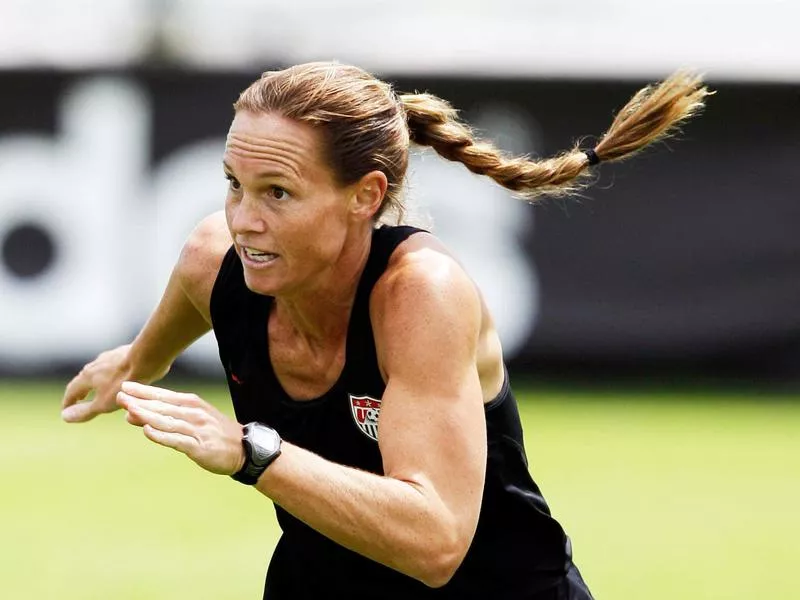
Christie Rampone during a training session of the US team ahead of the Women’s Soccer World Cup in Dresden, Germany on June 25, 2011. Marcio Jose Sanchez / AP Photo
Going into the 2015 FIFA World Cup Finals, Christie Rampone was the last of the legendary ‘99ers — the World Cup championship team that put U.S. women’s soccer on the map — to still be on the field.
She had just turned 40 — officially the oldest female soccer player to ever play at the World Cup — and it wasn’t even her most impressive feat. After giving birth to her fist child, Rylie, in 2005, she returned to the pitch 112 days later, and went on to become captain of the national team and win gold in the 2008 Beijing Olympics.
She came back in just 90 days after the birth of her second daughter, Reece, in 2010 — before placing second in the 2011 World Cup and winning gold, as team captain, in the 2012 Olympics in London.
On how motherhood improved her game:
“Suddenly, you gain all of this confidence because you can do it all. Yeah, I’ve come back from having two kids. I’ve played games with no sleep because I’ve been up with a sick kid. I can handle anything that’s thrown at me.”
On the perspective that comes with motherhood:
“Before kids, as a player, you have a tendency to overthink stuff. You’ve got too much time on your hands — you sit there in the hotel room over-thinking, stressing out, imagining things. As a mom you can’t do that — you’re focused on your true problems. The real things. And that really helped my game.”
Kerri Walsh Jennings, Volleyball
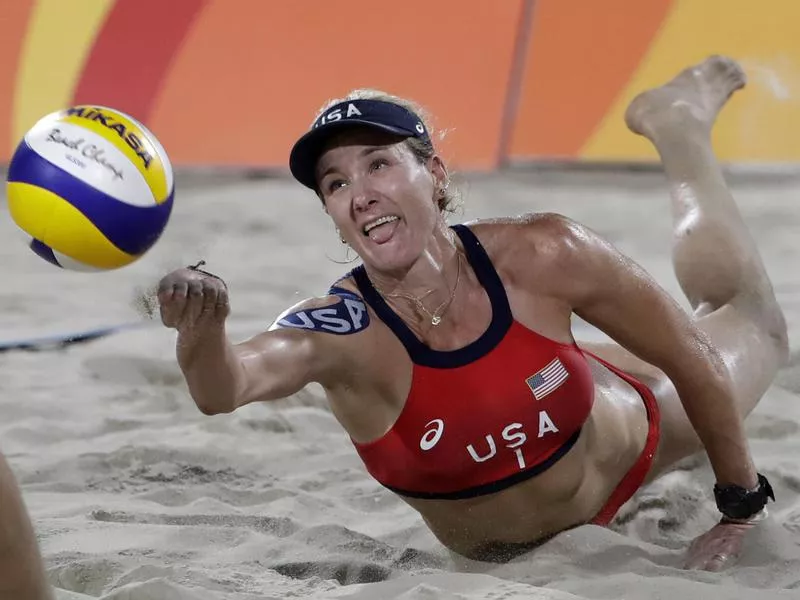
Kerri Walsh Jennings digs for a ball while playing Brazil during the women’s beach volleyball bronze medal match of the 2016 Summer Olympics in Rio de Janeiro, Brazil on Aug. 17, 2016. Marcio Jose Sanchez / AP Photo
Beach volleyball legend Kerri Walsh Jennings was five weeks pregnant with her daughter Scout at the 2012 Olympics in London — and already mother to two young boys, Joey and Sundance, at the time.
She and her partner Misty May-Treanor won gold, as they had in 2008 and 2004 before that.
Jennings and a new partner, April Ross, won bronze in the 2016 Olympics in Rio. She is currently partnered with Brook Sweat, although it’s unclear if she’s going to train for future Olympic trials.
On not letting motherhood stop her career:
“Life is so much bigger than the sponsorship deal … some people think you get pregnant, you have kids and your dream stops, and it’s just such nonsense.”
On finding meaning through motherhood:
“Before I had more kids, I was like, this feels trivial. I’d been playing for so long, and I was like I need balance. All my eggs are in this one basket and it’s very self-centered and self-focused. They gave me that perspective and balance I thought I was missing. It took my game and my desire and my passion for life to the next level. I am hugely indebted to my children.”
Kristin Armstrong, Cycling
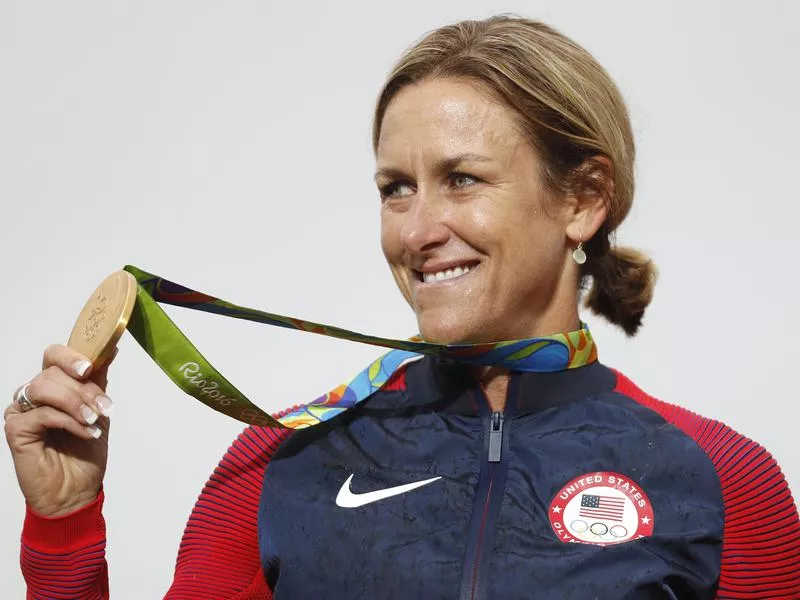
Cyclist Kristin Armstrong holds her gold medal during the podium ceremony of the women’s individual time trial event at the 2016 Summer Olympics in Rio de Janeiro, Brazil, on Aug. 10, 2016. Patrick Semansky / AP Photo
Cyclist Kristin Armstrong won gold in the 2008 Olympic games — retired to start a family, and then did it again in 2012 and in 2016, becoming the first cyclist, male or female, to win the same event three Olympics in a row.
And yet, the most decorated female cyclist in U.S. history is remarkably humble — she has a career outside of cycling and relishes her role as mom.
On winning gold — and making history — as a 43-year-old mom:
“I think that for so long we’ve been told that we should be finished at a certain age. And I think that there’s a lot of athletes out there that are actually showing that that’s not true.”
On motherhood as a secret weapon:
“It provides me balance and it keeps me on track and it keeps me super focused.”
Candace Parker, Basketball
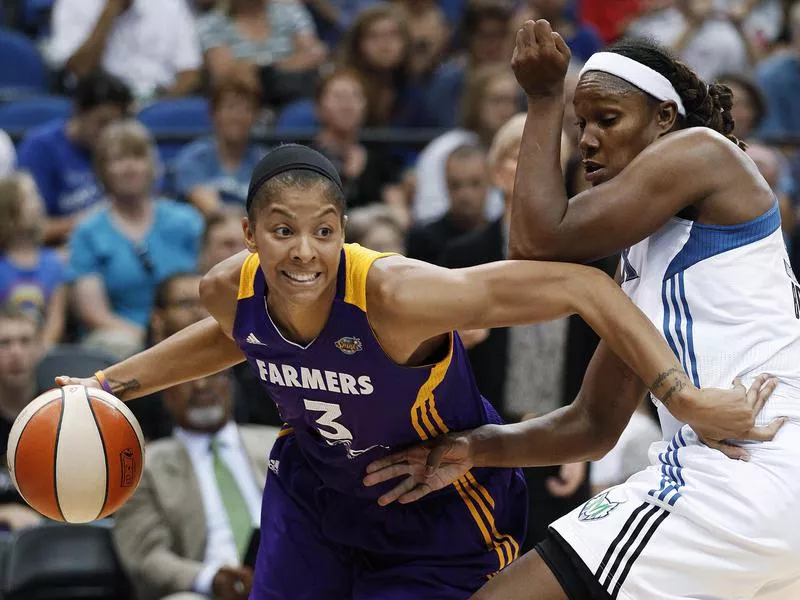
Los Angeles Sparks forward Candace Parker drives past Minnesota Lynx forward Rebekkah Brunson during a WNBA basketball game on Sept. 4, 2012, in Minneapolis. Stacy Bengs / AP Photo
In 2008, her first year in the WNBA, NCAA basketball sensation Candace Parker won league MVP, Rookie of the Year and AP Athlete of the Year.
Then, in 2009, she decided to have baby — much to the chagrin of a league that was counting on her to invigorate the sport. Parker came back to play for the Los Angeles Sparks seven weeks and one day after giving birth to her daughter Lailaa — helping the team get to the conference finals.
By 2013, Parker was back at the top of her game, again voted WNBA MVP, with two Olympic gold medals to her name, to boot.
On choosing motherhood on her own timetable:
“My whole career has been trying to please people in basketball. Now it’s time to please myself… For me, family has always come first.”
On having it all:
“There’s room for basketball, there’s room for Lailaa. I have, from a young age, said I wanted both. I want a career and I want a family and I wasn’t going to have to choose. Right now I’m living my dream because I have the best of both worlds. I go to basketball and I love it and I play and then I come home and there’s that joy.”
Lisa Leslie, Basketball
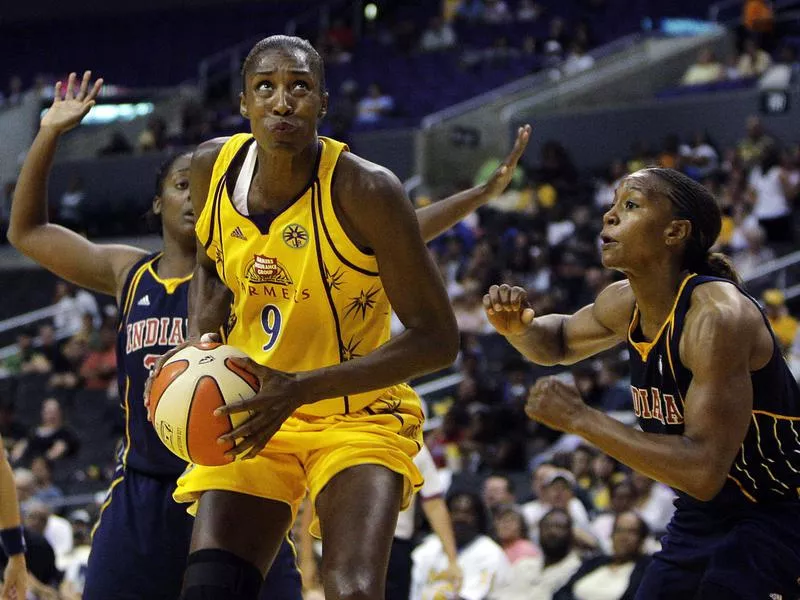
Los Angeles Sparks’ Lisa Leslie looks to shoot as she is pressured by Indiana Fever’s Tamika Catchings, right, during a WNBA basketball game in Los Angeles, Aug. 10, 2009. Jae C. Hong / AP Photo
Candace Parker was not the first WNBA player to become a mom mid-career, and not even the first Los Angeles Sparks player.
Three-time MVP Lisa Leslie sat out the 2007 season to give birth to her daughter Lauren. After returning to the game, she announced her retirement in 2009, citing how difficult it was to be an athlete, wife and mother.
Leslie had her second biological child, her son Michael, in 2010. (Her two eldest children were by marriage).
On the sacrifices mothers make:
“You really have to give your hats off to women who do this every day because you never understand their whole sacrifice until you go through it.”
On being a mom:
“I love being a mom… I think the best part about it is every morning when I go into her room and see her smile, and when I smile at her, she just says, ‘I’m happy.’”
Dara Torres, Swimming
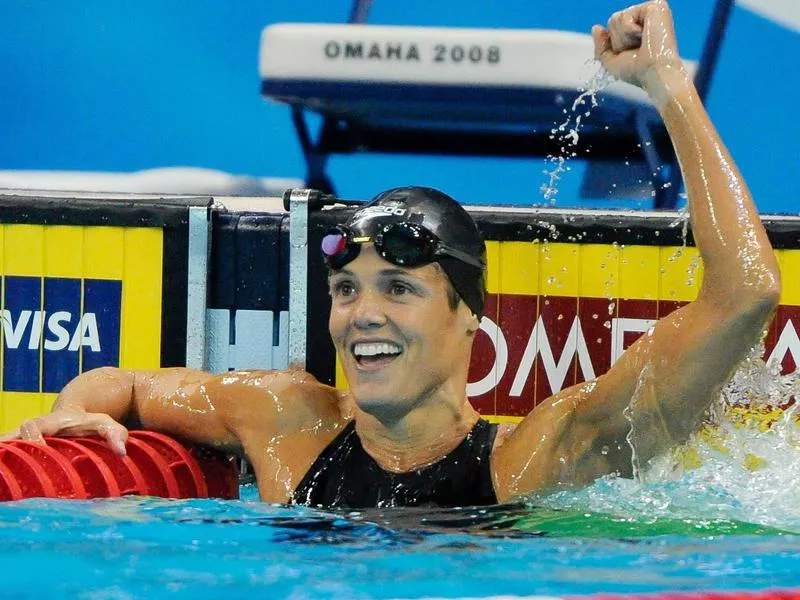
Swimmer Dara Torres celebrates setting a US record time of 24.38 in the women’s 50-meter freestyle semifinal at the US Olympic swimming trials in Omaha, Neb. on July 5, 2008 Mark J. Terrill / AP Photo
In what has been called “the mother of all comebacks,” Olympic swimmer Dara Torres came out of retirement for a second time to break a world record — just three weeks after giving birth to her daughter, Tessa.
Torres then smashed her own American record and went on to compete on her fifth Olympic team in the 2008 games in Beijing, its own historic achievement.
There, she earned silver — and became, at age 41, the oldest American woman to swim for the United States.
On her daughter’s role in her comeback:
“In many ways, it was the arrival of Tessa that inspired me to start all over again. I was still swimming to keep fit, and after Tessa was born, a light bulb just went off in my head. I thought it would be cool to compete at the Olympic Games as a mother and I hoped, when she got older, it would be something she could be proud of.”
On learning from other working parents:
“It’s never easy. There’s always the feeling of guilt when I travel for work, and I feel I’m not always there for my daughter and step kids. The key is to find the right balance that works for you. It’s different for everyone, so I find inspiration in other working parents who show me that it is possible to do what you love and still be a good parent.”
Kikkan Randall, Cross Country Skiing
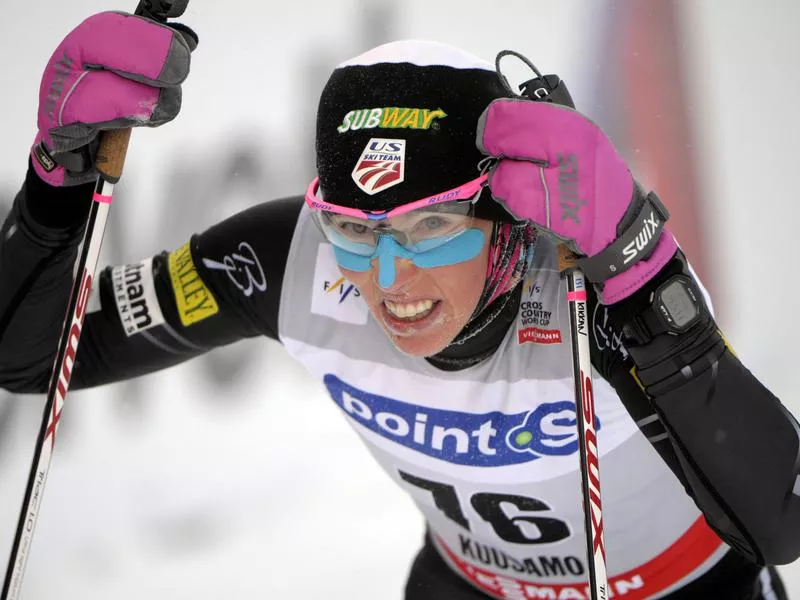
Kikkan Randall of the US finishes second in the women’s 5km cross country freestyle skiing competition, during the FIS World Cup Ruka Nordic Opening 2012, in Kuusamo, Finland on Dec. 1, 2012. Markku Ulander / AP Photo
World class skier Kikkan Randall was the only mother on the entire 2018 U.S. Winter Olympic team — but that didn’t stop her from bringing home gold. (She shared the podium with another mother-cum-elite skier, Marit Bjorgen of Norway).
After her son Breck was born in April 2016, Randall returned to training after less than a month, and her husband, Jeff Ellis, took on the lion’s share of the parenting.
On asking for — and getting — mom-friendly accomodations from the International Ski Federation:
“Men can have families, and they don’t ever have to miss a single race…. Knowing we were all having babies, we lobbied to have some support for moms that first season back. It’s the first time the international federation has provided that kind of support.”
On balancing motherhood and racing:
“Just hours before I won a World Championship bronze medal, I was changing diapers and washing out bottles. Turns out baby chores are great for settling nerves.”
Jennie Finch, Softball
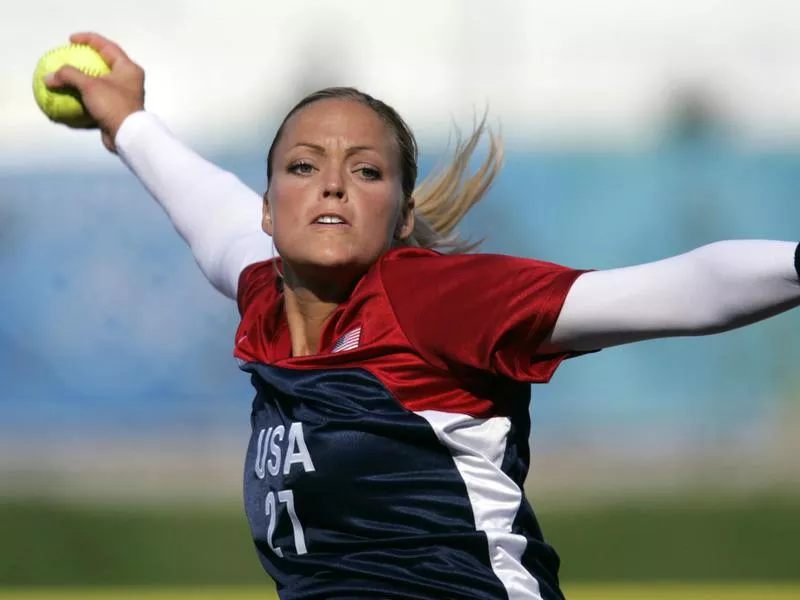
United States starting pitcher Jennie Finch throws against Canada Wednesday, Aug. 18, 2004, in softball at the 2004 Olympic Games in Athens. The U.S. beat Canada 7-0 in five innings. Elaine Thompson / AP Photo
Perhaps the most famous softball player in American history, Jennie Finch helped bring home Olympic silver in 2008, after the birth of her son, Ace, in 2006.
And after retiring from softball to focus on family, Finch continued as an athlete, running a half-marathon while five months pregnant with her son Diesel and a full marathon four months after giving birth to him.
Her third child and first daughter, Paisley, was born in 2013.
On bringing her son along during the softball season:
“I don’t know if I could do it if I couldn’t be with him. I don’t even want to have to think about it. And they made it so I didn’t have to think about it.”
On motherhood versus being an Olympian:
“Both are such a blessing, and both require work of a different kind. It’s impossible to compare the two except to say that if you put in the work the rewards and joy you reap are amazing in both cases.”
Kim Clijsters, Tennis
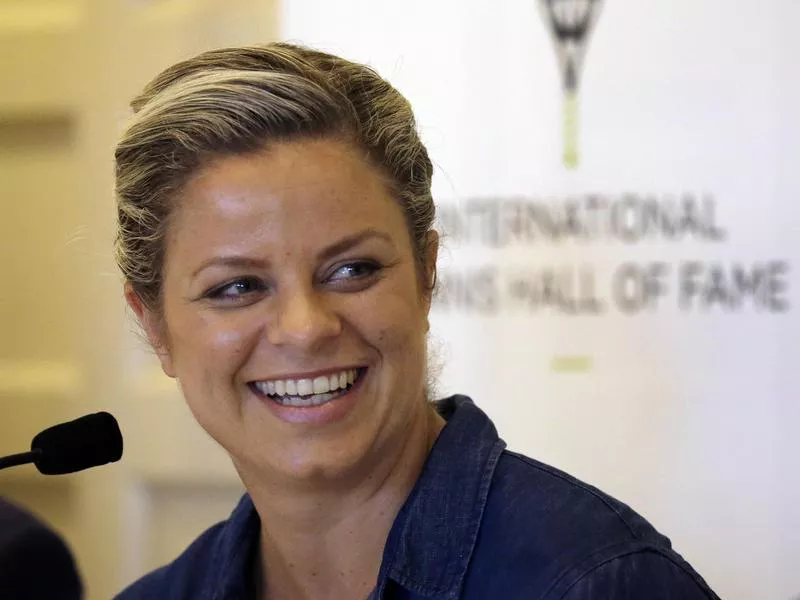
Tennis Hall of Fame inductee Kim Clijsters of Belgium smiles during a news conference before enshrinement ceremonies at the International Tennis Hall of Fame on July 22, 2017 in Newport, R.I. Elise Amendola / AP Photo
In 2009, when Kim Clijsters, of Belgium, beat Serena Williams, and then Caroline Mozniacki, to win the U.S. Open, she became the first mother to win a major tennis event in almost 30 years.
What’s notable is that she came out of retirement — when she chose to start a family — to do it. Her daughter Jada was born in February 2008.
Clijsters went on to win two more titles before retiring for good in 2012, and is now a mother of three.
On parenting while on the road:
“Jada was potty-trained in a hotel room, too. All the little things like that happened while we were travelling the world.”
On the perspective that children bring:
“It is your family and kids that are important — and bringing them up the right way. No trophy even comes close.”
Brittney Reese, Track and Field

United States’ gold medal winner Brittney Reese celebrates after the women’s long jump final during the World Athletics Championships in London, Aug. 11, 2017. Matthias Schrader / AP Photo
Brittney Reese — the world’s No. 1 long-jumper from 2009 to 2013 — was one of 10 mothers on Team USA, heading into the 2016 Olympics in Rio de Janeiro.
A single mom, she adopted her godson, Alex, who was 8 at the time.
On having a son who is your biggest fan:
“He is a good motivator, he’s at the end of the runway saying ‘let’s go Brittney’.”
On choosing single motherhood:
“It always felt like he was mine anyway since I had helped to raise him since he was born; he is attached to me. He’s active and he listens to me more than anyone else, and it’s just one of those situations where I just wanted him to be in my eyesight at all times.”
Nia Ali, Track and Field
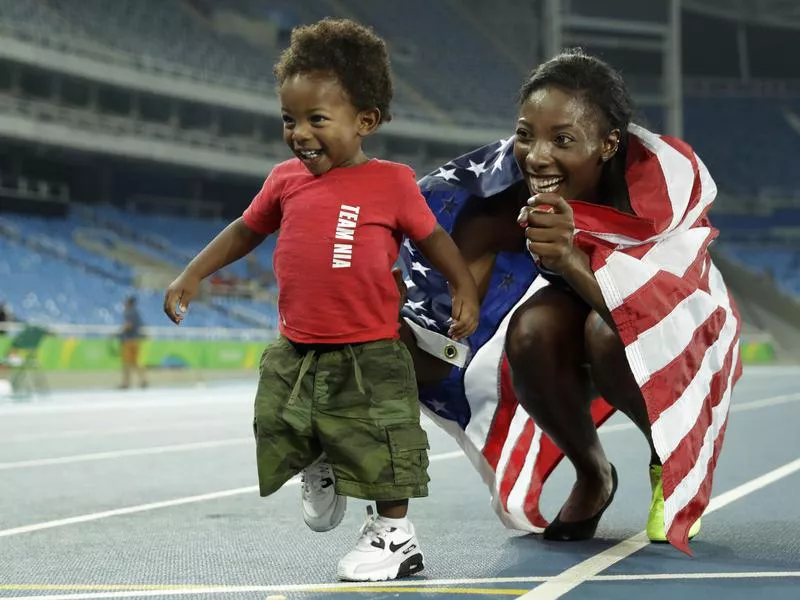
United States’ silver medal winner Nia Ali poses with her 15-months old son Titus after the women’s 100-meter hurdles final at the 2016 Summer Olympics in Rio de Janeiro, Brazil, Aug. 17, 2016. Matt Dunham / AP Photo
Nia Ali was also on the U.S. Track and Field Team for the 2016 Olympics in Rio.
Ali’s son, Titus — whose father is also an Olympic Track and Field star — took the victory lap with her when she won silver in the 100-meter hurdles. He was just 15 months old.
On motherhood not being an obstacle to her career:
“I never once thought career suicide. It was a great thing. I want to have lots of kids. I never once thought I would not come back and run.”
On the importance of having a support system:
“I love my son, love coming back home after long days. It puts what I do on the track in a perspective, and I have an amazing support system that helps make it happen. I can’t take the full credit.”
Kara Goucher, Distance running
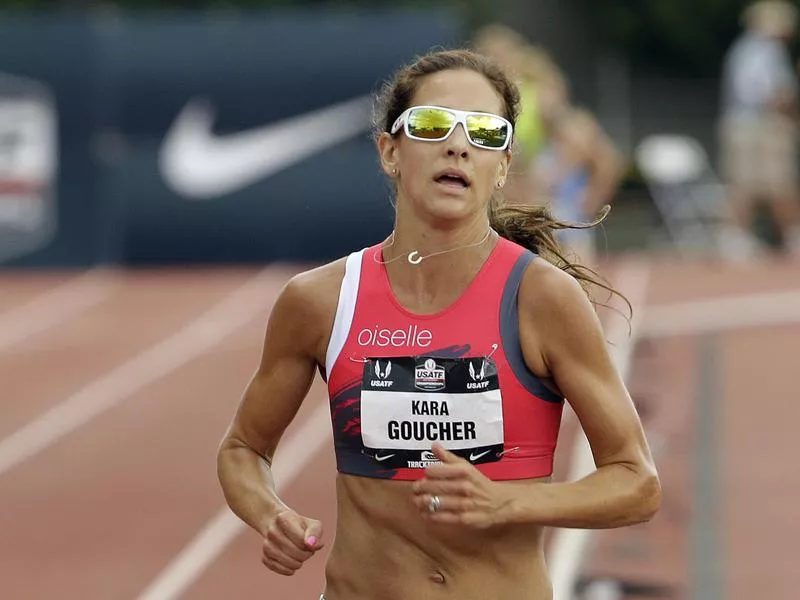
Kara Goucher runs in the 5,000-meter at the U.S. Track and Field Championships in Eugene, Ore., June 28, 2015. Don Ryan / AP Photo
Olympic long distance runner Kara Goucher ran the New York City half-marathon just six months after giving birth to her son, Colt, in 2010.
The following year, she ran her fastest marathon ever.
On the benefits of running as a mother:
“As an athlete, I like to be very focused. In my training, I get upset if I am one second off. I see everything and plan everything. Colt has knocked me on my side. I realize I can’t start perfectly on time, things will get thrown off. It’s been good for me; it’s relaxed me.”
On the parallels between motherhood and marathons:
“For a race, you train and prepare in every way possible, but on race day you have to relinquish control. You can’t control the weather, how you feel that day, or how other runners race. On race day, you have to do your best with what you are given. Parenting is the same in that you can do your best to be ready for anything (have extra wipes, pack lots of snacks, toys, etc), but you also have to be prepared to go with the flow. Focus on what you can do to be as prepared as possible, and be ready to adjust when necessary.”
Paula Radcliffe, Distance Running
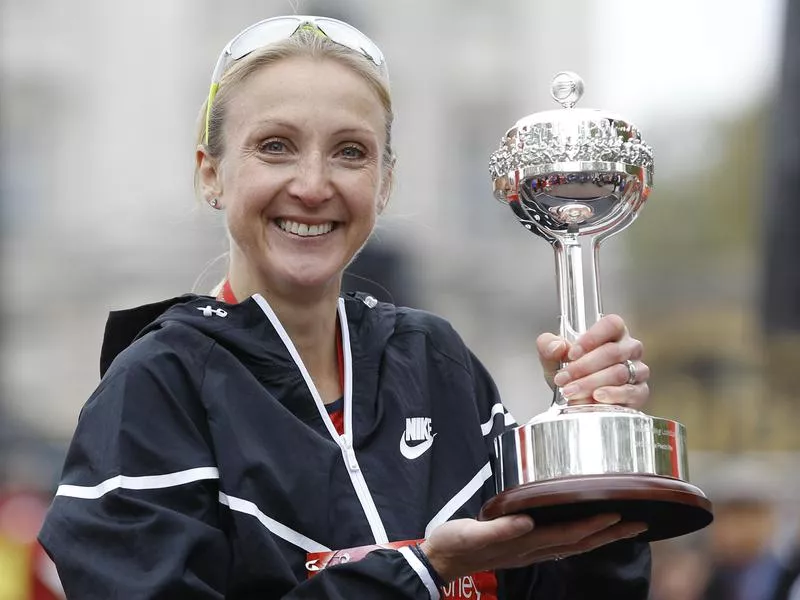
British athlete Paula Radcliffe smiles after she was presented with a lifetime achievement award during the 35th London Marathon on April 26, 2015. Kirsty Wigglesworth / AP Photo
Four days after Kara Goucher gave birth to Colt, Paula Radcliffe — the the world record holder in the marathon — gave birth to her second child.
Indeed, Goucher found a lot of inspiration in Radcliffe, who won the New York City Marathon in November 2007, having given birth to her daughter, Isla, in January of that same year.
On the importance of seeing other mothers compete and win:
“I was fortunate I had role models, people like Liz McColgan who won a world championship in 1991, the year after her first child was born, and Irish runner Sonia O’Sullivan, who won silver at the 2000 Olympics the year after giving birth.”
On the effects of motherhood:
“Being a mum has made me so much calmer.”
Dana Vollmer, Swimming
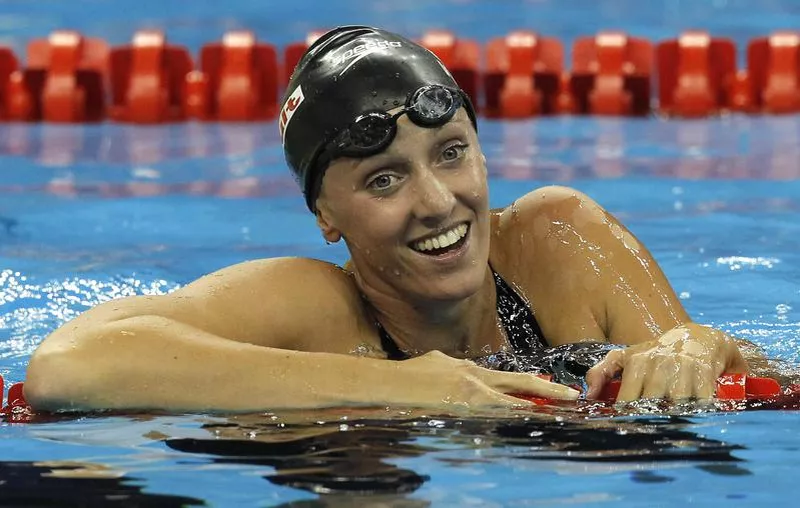
Dana Vollmer celebrates after winning the women’s 100m Butterfly final at the FINA Swimming World Championships in Shanghai, China, on July 25, 2011. Wong Maye-E / AP Photo
Calling herself “momma on a mission,” swimmer Dana Vollmer made the 2016 USA Swimming Team just 15 months after giving birth to her son, Arlen — and then went on to win bronze, silver and the first-ever gold medal in swimming by a mother in Rio that summer.
Vollmer then competed nationally at 26 weeks pregnant with her second child, who was born in July 2017.
On swimming and being a mom:
“I want to combine the two, my love of competing at an Olympic Games with the love of my family and the routine I’ve developed and worked for me.”
On having new priorities as a mom:
“[Motherhood] broadens your perspective. It’s no longer all about making an Olympic team; it’s about these two little boys who are going to grow up and that’s way more important.”
Kim Rhode, Shooting
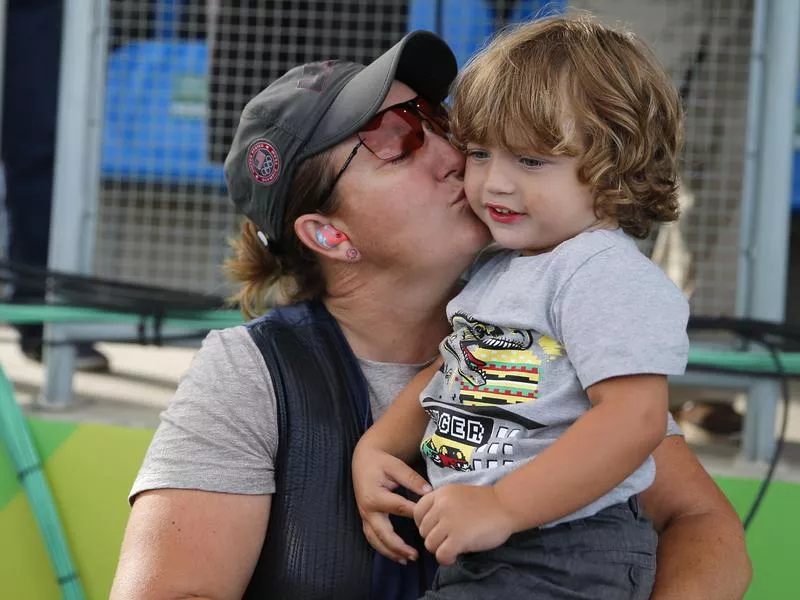
Kimberly Rhode kisses her son Carter after winning the bronze medal in the women’s skeet bronze medal match at Olympic Shooting Center at the 2016 Summer Olympics in Rio de Janeiro on Aug. 12, 2016. Hassan Ammar / AP Photo
Shooter Kim Rhodes made Olympic history in the 2016 Rio Olympics — as the first summer Olympian to win six consecutive individual medals.
And she did so as mom to son Carter, who was born in 2013.
On unknowingly competing while pregnant in the 2012 Olympics:
“Maybe this isn’t exhaustion from working so hard and traveling to all these different places. Maybe there’s a little more to this.”
On being just another working mom:
“Obviously my main focus is my child, but at the same time, there are many mothers out there that work and juggle everything, and I think I’ll probably be just one of them.”